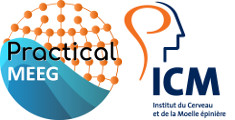PracticalMEEG workshop at ICM in Paris
PracticalMEEG aims at providing an intensive several–days training to MEG and EEG analysts. It will provide its attendees with the ability to create a full analysis pipeline with exemplar (or their own) data in one or several of three leading software dedicated to MEG and EEG analysis (Brainstorm, FieldTrip and MNE-Python). More details can be found here.
Where
ICM Institute for Brain and Spinal Cord Hôpital Pitié Salpêtrière 47 Boulevard de l’Hôpital 75013 Paris, France
When
3-5 December 2019.
Who
Maximilien Chaumon is the local organizer.
Robert Oostenveld and Jan-Mathijs Schoffelen will come from the Donders to lecture and tutor, assisted by Stephen Whitmarsh (who is a former Donderian), and various other people from the MNE and BrainStorm teams.
Program and training material
Please visit the http://practicalmeeg2019.org website for more information.
All hands on sessions will be using the same dataset.
Schedule
Day 1 (Tuesday December 3, 2019)
- 08:30 – 09:00 Registration, with coffee/tea + Welcome & intro
- 09:00 – 10:30 Lecture 1: Data organization (Robert) and initial data processing(Alex)
- 10:30 – 12:30 Hands-on 1a: From raw to ERPs using FieldTrip
- 10:30 – 12:30 Hands-on 1b: From raw to ERPs using Brainstorm
-
10:30 – 12:30 Hands-on 1c: From raw to ERPs using MNE-Python
-
12:30 – 13:30 Lunch
- 13:30 – 15:00 Lecture 2: Sensor level analysis (JM)
- 15:00 – 17:00 Hands-on 2a: Sensor level analysis using FieldTrip
- 15:00 – 17:00 Hands-on 2b: Sensor level analysis using Brainstorm
- 15:00 – 17:00 Hands-on 2c: Sensor level analysis using MNE-Python
- 17:00 – 17:30 Wrap-up / Q&A session
Day 2 (Wednesday December 4, 2019)
- 09:00 – 10:30 Lecture 3: Source estimation 1 (Alex & François)
- 10:30 – 12:30 Hands-on 3a: Creating head and source models using FieldTrip
- 10:30 – 12:30 Hands-on 3b: Creating head and source models using Brainstorm
-
10:30 – 12:30 Hands-on 3c: Creating head and source models using MNE-Python
-
12:30 – 13:30 Lunch
- 13:30 – 15:00 Lecture 4: Source estimation 2 (Denis)
- 15:00 – 17:00 Hands-on 4a:
Single andDistributed sources using FieldTrip - 15:00 – 17:00 Hands-on 4b: Single and distributed sources using Brainstorm
- 15:00 – 17:00 Hands-on 4c: Single and distributed sources using MNE-Python
- 17:00 – 17:30 Wrap-up / Q&A session
Day 3 (Thursday December 5, 2019)
- 09:00 – 10:30 Lecture 5: Group level analysis (Robert)
- 10:30 – 12:30 Hands-on 5a: Group level analysis using FieldTrip
- 10:30 – 12:30 Hands-on 5b: Group level analysis using Brainstorm
-
10:30 – 12:30 Hands-on 5c: Group level analysis using MNE-Python
-
12:30 – 13:30 Lunch
- 13:30 – 15:00 Lecture 6: Miscellaneous topics
- 15:00 – 17:00 Hands-on 2: Playground and final try out
- 17:00 – 17:30 Wrap-up / Q&A session
Tutorial preparation
For the actual course, we will bring the required data and a recent FieldTrip version on a set of USB flash drives, to ensure that everybody will be up-and-running relatively quickly. Please read the USB instructions page carefully to copy the right files, and to unpack them properly on your computer.
If you are doing these tutorials outside the practicalMEEG course, you should read on to get information about the FieldTrip software requirements and where you can get the data.
Ensure that you have a recent version of FieldTrip on your computer
For this workshop, we have created a set of dedicated tutorials, and fixed some small bugs in FieldTrip in order to get everything to run smoothly. Therefore, you should have a really recent version of the code, otherwise the tutorials will not run through without errors. Specifically, you need to have the code not ‘older’ than November 25, 2019.
You should start by getting an up-to-date copy of FieldTrip. This is best done through github, as is explained in detail in a dedicated page. The FieldTrip code and website are both maintained on https://github.com/fieldtrip.
To quickly get access to the code, you would do the following from the command line or the equivalent in a graphical git interface, such as the GitHub desktop.
git clone https://github.com/fieldtrip/fieldtrip.git
This allows you to easily track the changes that we make to the code. If you also want to contribute back, please make an account on GitHub, fork fieldtrip/fieldtrip to your own account and read the aforementioned page.
Once FieldTrip is on your computer, the toolbox needs to be added to the MATLAB path. To achieve this, do the following:
- Change directory to the location of the FieldTrip package. Note the subfolders present.
-
Add the FieldTrip folder to the path with
addpath(‘path_to_fieldtrip’)
Note: do not add the folder recursively, i.e., do not use addpath(genpath('path_to_fieldtrip')).
- Run ‘ft_defaults’ in MATLAB.
- Confirm that FT has been successfully added to your path, for example by typing ‘which ft_preprocessing’ in Matlab; the correct path should be displayed.
Get the example data that is used throughout this set of tutorials
The full dataset can be obtained from OpenNeuro, and has a size of about 460 GB. The pruned subset of the data that is needed for this collection of tutorials - and the results of running these tutorials - can be downloaded from our download server and specifically in the ds000117-pruned folder. The results of the pipelines used in these tutorials are located in the derivatives folder.
